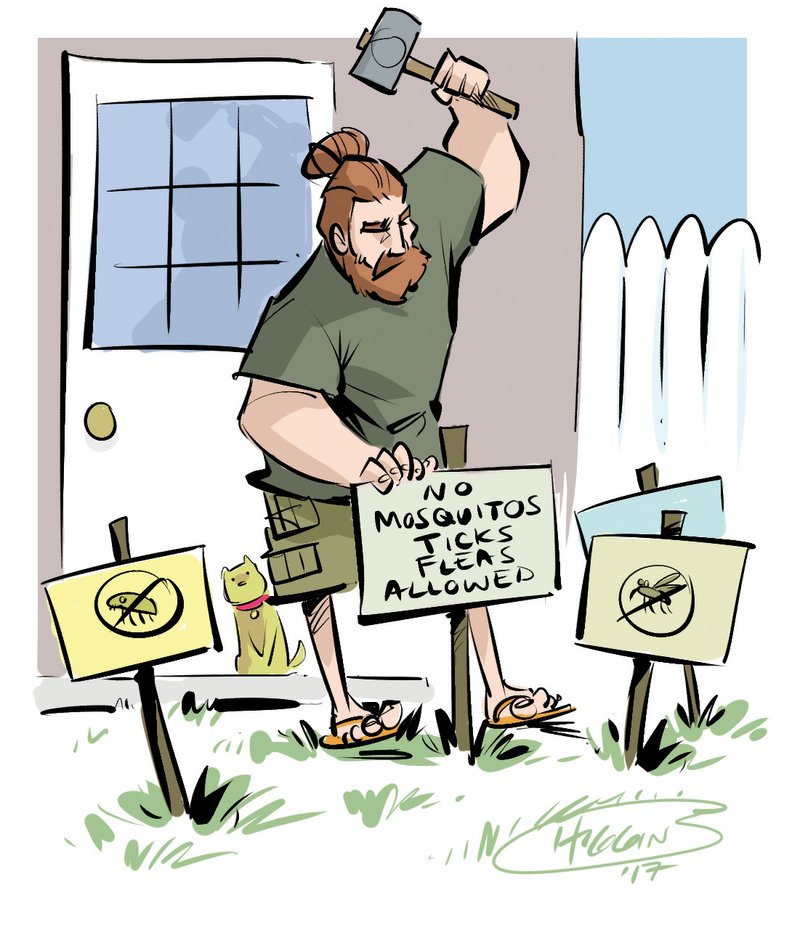Spring's in full swing, which means the reappearance of pests that fly, crawl, hop, buzz and bite our pets. Last week's column addressed how to deal with ticks so this week we'll take a look at fleas and mosquitoes.
When discussing tick prevention methods, entomologist Kelly Loftin of the University of Arkansas System Division of Agriculture says the best tactic is to make a yard inhospitable by keeping it clear of tall grass and debris. Similar advice applies when it comes to keeping fleas and mosquitoes at bay.
MOSQUITOES
Mosquitoes need to be controlled to lower the risk of dogs and cats contracting heartworm disease, which infected mosquitoes transmit through biting. Mosquitoes lay their eggs in standing water so the natural way to keep their numbers down is to avoid providing them with a breeding ground.
"Try not to have any standing water around your house," Loftin says. "Empty bird baths as often as every day or two. Empty any container holding water and check your gutters to make sure they're draining completely. If you have any old tires around, keep water out of those."
If you have water collection pans beneath potted plants, make sure they're emptied regularly. Survey your yard for outside leaks (such as in faucets and sprinkler systems) that might create pools of standing water. Decorative fish ponds without water circulation systems need to be cleaned and the water changed every few days, Loftin says.
In addition to keeping fish ponds clean, Loftin says, homeowners might consider increasing their aquatic stock by adding a few gambusia, also known as the "mosquitofish." The guppy-like gambusia eat mosquito eggs.
"Mosquitofish can really do a number on the larvae," he says.
Naturally, any anti-heartworm plan includes providing pets with heartworm preventive medications year-round. Talk to your veterinarian about topical and oral medications available for your pet. You also can find up-to-date information from the American Heartworm Society at heartwormsociety.org.
FLEAS
Fleas are hitchhikers and find their way into yards by hopping aboard squirrels, rabbits, raccoons, rats and opossums. Your first line of defense is to make your yard uninviting as a potential home for flea-carrying animals by keeping the grass mowed, trimming shrubs and removing piles of decaying leaves. It's also helpful to clear trash and lawn debris from areas under decks and behind outbuildings.
In the UA Extension publication "Pest Management," entomologist John Hopkins says the best time to begin a flea prevention project is in late spring. Outdoor flea treatments with insecticides should target areas where pets might rest and run, including under decks, along fences and next to foundations. Fleas like darkness so it's not necessary to treat areas that are in full sunlight. The extension offers a detailed guide to insecticides that kill fleas at tinyurl.com/ldyyy28.
To tackle fleas inside the house, begin by using a flea preventive on your pet. There are many options so you need to talk to your veterinarian to make sure you use one that's appropriate for your dog or cat based on species, age and health. Cats cannot use the same anti-flea products as dogs because some contain ingredients toxic to cats.
Regular bathing also helps keep pets flea-free. While you can use a shampoo that contains an insecticide, it's not required because regular cat or dog shampoo will eliminate fleas that are on them at the time of the bath.
Preventing an infestation or getting rid of fleas requires daily diligence, Hopkins says. Fleas live in cracks and crevices, furniture used by pets, and in rugs and carpets. He suggests thorough cleaning and daily vacuuming to remove eggs and larvae. Carpeted areas can be treated with products that kill adult fleas and contain insect growth regulators that keep larvae from maturing.
Family on 04/19/2017
